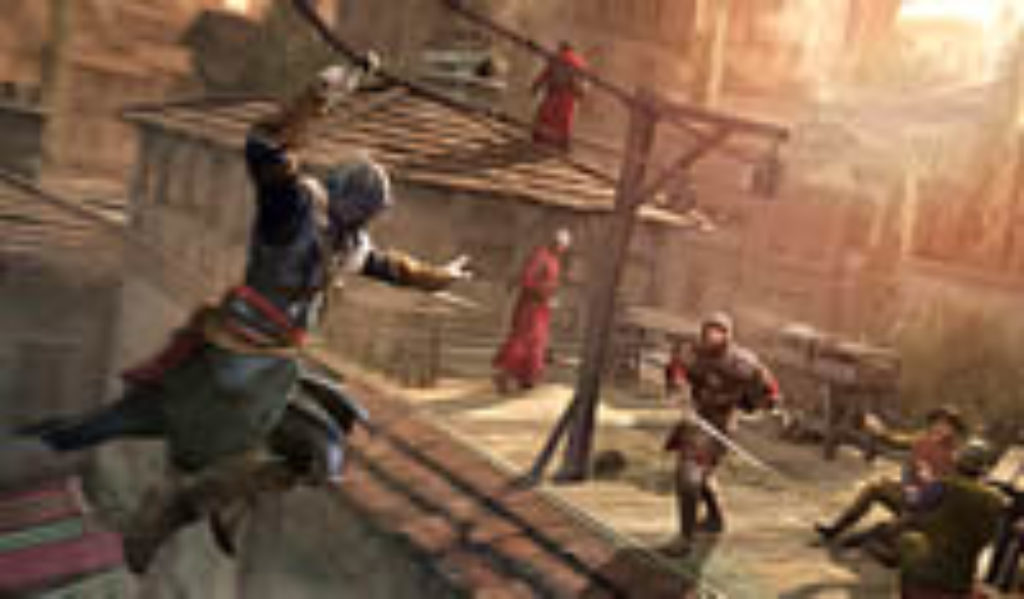
Never mind that the Assassin’s Creed franchise has sold millions of games and has been spun off into comics, novels, movies, art books and even an encyclopedia. What I want to know right now is whether or not a certain 15th century assassin would know what it means to “jump the shark.”
Probably not. But now that we’ve reached the fourth Assassin’s Creed game, he’s living out that snarky expression as gamers try to wrap their brains around some pretty complicated stuff in order to give this dense, convoluted, worn-thin story someplace to go.
Let Me Clear This Up
To keep confused gamers from jumping ship, the developers at Ubisoft decided to start Revelations with a quick catch-up narration. It goes something like this: The Assassin’s Creed conflict began when a modern day, hapless bartender named Desmond was kidnapped by an evil tech corporation and strapped into its new invention called the Animus. The Corp, a front for the 21st century Knights Templar, discovered that people’s DNA can actually hold the memories of their ancestors. And with a little high-tech finagling, anyone can be sent back to relive some of Great-Great-Great-Granddad’s favorite moments.
Desmond’s ancestors, however, weren’t just average Joes chucking bocce balls around the yard. They were key members of a class of “freedom-loving” assassins who were dead set against the world-domination-focused Templars. So the present-day Templars send him back to act out his assassin memories and thereby reveal the whereabouts of powerful religious artifacts that were secreted away and have been lost to time.
As fans made their way through games two and three, the power struggle in our world continued as Desmond was jockeyed back and forth between different groups. The memory action moved from shadow-slipping kills in the Crusades-era Middle East to roof-vaulting attacks in 15th century Italy. And now, with Revelations, Desmond’s tugged-and-pulled psyche is trapped in the Animus itself. So he must work his way through unrevealed parts of his ancestors’ lives in order to somehow reclaim his own. Around him, the story shifts from being merely a power struggle between two ancient factions to becoming a stalwart effort at averting a supernatural global catastrophe.
OK, Maybe Not
Do you feel up to date? Got the whole thing down pat? Didn’t think so. But you don’t really have to. Past, present and future, Assassin’s Creed has been, is and will be primarily about … assassinations. And its core “sneak and kill” mechanic is pretty much unchanged here.
Like the rest of the series, this is a game that allows you to slip into a hooded cloak and go free-running across rooftops and through a graphically gorgeous ancient city—this time Constantinople. Gameplay is all about hunting for treasure, swinging and leaping with parkour panache, finding and equipping the finest weapons and armor, stealing loot, fulfilling puzzle quests and, of course, stalking and slaughtering human targets.
There are a few new bits worth mentioning. Playing as a DNA memory of Ezio Auditore da Firenze (most of the time), you gather bomb ingredients to build your own store of explosives. And you’re packing a new weapon called a hook blade. This blade “lets” you upgrade your melee takedowns and perfect your building-climbing moves. And on the side you can use it to zip along the city’s network of aerial cables, leaping down from time to time for a quick kill.
Ezio also takes on the protection of his newfound assassins’ brotherhood. So you’re given charge of a tower defense minigame that adds a twist: You must recruit and level up other assassins and position them on rooftops where they can rain down arrows, musket balls and cannon blasts on your enemies.
Problems Past and Present
Let’s face facts, though: It really all comes back to the sneaking and killing side of things. If you read any of our past reviews of this series ( Assassin’s Creed, Assassin’s Creed II, Assassin’s Creed: Brotherhood), you’ll see the same litany of messy problems this game suffers from. The dialogue contains a smattering of foulness—the f-word and misuses of God’s name, along with “b‑‑tard,” “a‑‑” and “h‑‑‑.” The story is a bizarre quasi-religious mash-up. You witness and perpetrate lots and lots and lots of neck-slashing, torso-stabbing murders.
Blocking an enemy’s sword blow and then spinning to punch him in the face, stab him in the foot and impale him through the abdomen with a set of hidden wrist blades can feel like a psychotically “cool” deathblow in the heat of the moment. But that is perhaps this franchise’s sneakiest move: It catches you up in a metaphysically grand conspiracy, pulls you along with smooth and fluid mechanics and tantalizes you with a dazzling ancient world. Before you know it, you’ve lost track of just how bloody your button-mashing “fun” has become.

After spending more than two decades touring, directing, writing and producing for Christian theater and radio (most recently for Adventures in Odyssey, which he still contributes to), Bob joined the Plugged In staff to help us focus more heavily on video games. He is also one of our primary movie reviewers.